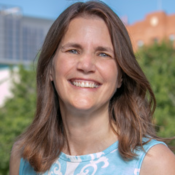School of Social Work’s guidebook gives practitioners valuable resources to help parents with disabilities

Photo courtesy of iStock/Getty Images
Parents whose children have disabilities can turn to a wide variety of resources to assist them with helping their kids navigate their lives.
But Arizona State University Distinguished Professor of Social Policy Elizabeth Lightfoot discovered through her research that when the parents themselves have the disabilities, not only are the resources often ridiculously few, the social services system can — and has — wrongly decided the children’s interests are best served by taking them away.
Lightfoot, who has researched the difficulties of parents with disabilities for many years, headed a team that has written a new, free guidebook for social workers who work with such parents in Arizona.
“Supporting Parents with Disabilities: A User-Friendly Guide for Social Service Providers” was published in July in English and Spanish through a grant from the Arizona Developmental Disabilities Planning Council.
The number of affected people isn’t small. At least 10% of U.S. children have a parent with some kind of disability. The percentage jumps to 20% for kids in the child welfare system, according to Lightfoot.
About 15 years ago, Lightfoot started researching how various social services are and aren’t available to people with disabilities. These include services that do not address their disability directly, such as those that child welfare agencies provide.
“I started looking up policies/laws just for one state, and was shocked that a parent having a disability was grounds for terminating parental rights,” said Lightfoot, who is director of the ASU School of Social Work.
“I looked at other states. Arizona is included on this list,” she said.
Lightfoot’s research on how many states have antiquated laws governing this issue received the attention of the National Council on Disabilities. The council used Lightfoot’s findings to release a report that received widespread acceptance, although change has been slow and many social services workers continue to hold unfounded beliefs about parents with disabilities, she said.
Little research shows that these parents neglect or abuse their children, yet eugenics laws of the early 20th century allowed authorities to sterilize people with disabilities to prevent them from passing on their conditions to offspring.
“The sterilization ideas faded away, but not the idea that these people were considered to not be good parents,” Lightfoot said.
Lightfoot continues her research at ASU and as an investigator with the National Research Center for Parents with Disabilities (NRCPD), based at Brandeis University. The NRCPD website contains several articles Lightfoot wrote or co-wrote.
Many social workers say they never thought about issues these parents face, she said.
One such issue is called the “presumption of unfitness” bias, where social workers, teachers, doctors and others in social services assume such parents are not going to be good parents.
“If someone has a disability, it’s automatically a bad thing. They have to navigate that all the time,” Lightfoot said. “Because of that, they get reported to child protection authorities a lot. They have to be careful who they talk to, whom they allow in their house. They don’t talk to social services because they’re afraid they’ll be reported.”
Lightfoot recalled an example from more than a decade ago in Massachusetts. A young woman with a disability gave birth, but remained in the hospital because, at first, she was having difficulty breastfeeding and changing the child’s diapers. The situation was reported to child protection authorities, who doubted she could care for the child, according to a 2015 NBC News story about the case.
“What they didn’t know is that the woman’s mother, who had just retired early, had arranged to have her daughter and the baby move in with her,” Lightfoot said. “It took two years for the mother to get her child back.”
Authorities presume parents with disabilities don’t have anyone supporting them, Lightfoot said, but this family did.
“That’s why people are scared to have anyone come help them," she said.
The free guidebook for parents with disabilities is available here.
The School of Social Work is part of the Watts College of Public Service and Community Solutions.
More Local, national and global affairs
ASU's Future Security Forum sees climate change, tense foreign relations as threats
Worsening climate change and escalating tensions with China are two of the biggest issues affecting the future of the U.S., according to several experts who addressed a national security conference…

Arizona governor: Cross-border collaboration is more important than ever
It was a little after 9 a.m. last Friday when Irasema Coronado, the director of Arizona State University’s School of Transborder Studies, began her remarks.Nearly 100 people had gathered at…

5 ASU students receive Boren Awards for critical foreign language study
The Lorraine W. Frank Office of National Scholarships Advisement (ONSA) has announced that five Arizona State University students have received Boren Awards for immersive study of foreign languages…
